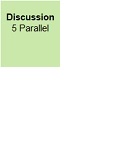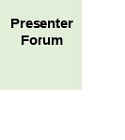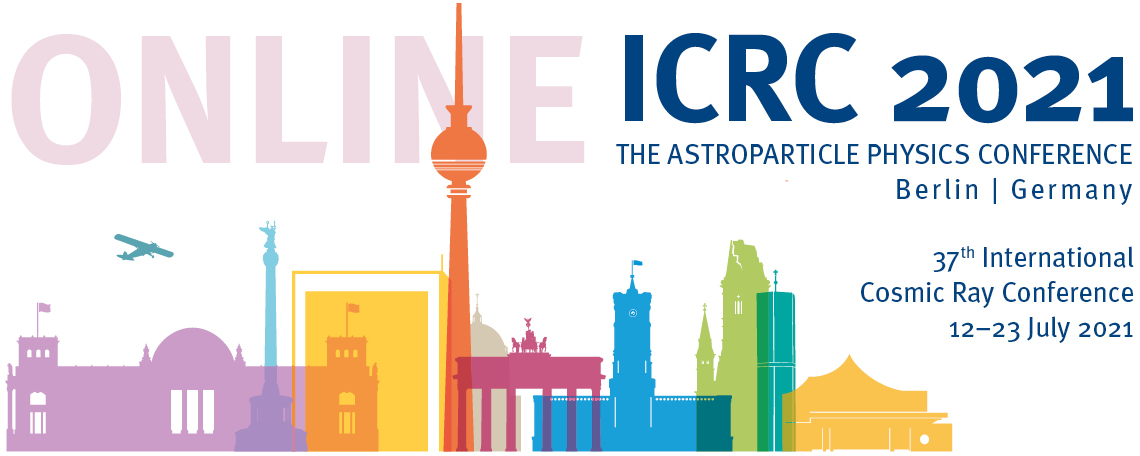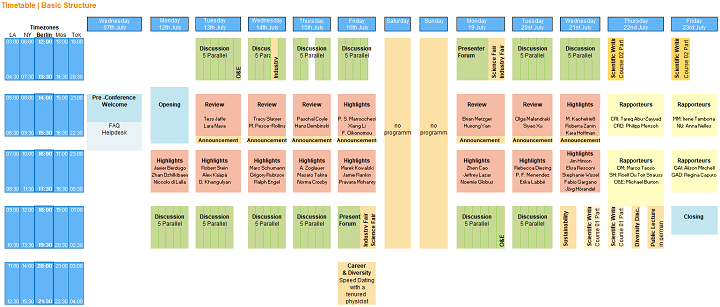Program
Timetable
Plenary Speakers
Scientific Topics
Exhibition
Careers
Diversity
Sustainability
VF Hess Lecture
Timetable | Basic Structure
Program
Abstracts: On the Indico webpage you can create a pdf list/timetable of all abstracts. Indico is open for all. See the program.
Proceeding Papers: The Procceding Papers are open for everybody here.
The core time span is 14:00-18:00 h in Berlin time (CEST | UTC+2).
To accommodate participants from time zones from Tokyo (Berlin +7 h) to Los Angeles (Berlin -9 h), the conference schedule is centred around 16:00 h Berlin time. In the core time, plenary presentations are scheduled which are live streamed:
Plenarys: Invited talks, Highlight talks (red)
Invited review talks (~10 x 45 min),
highlight talks (~20 x 30 min),
Rapporteur talks (yellow; 8 x 45 min).
Before and after the core time:

Conference Contributions (short talks or posters) are available online (pre-recorded) throughout the conference and can be viewed at any time.
In topical discussion sessions (green; before and after the core time), contributions that are relevant to the respective topic of the session are discussed.
Topical discussion sessions are organised in parallel (up to 5 parallels x 12 sessions x 90 min).

All contributions which are not scheduled within the Discussion Sessions will be scheduled for small-group discussions
with the presenter and interested participants during the "Presenter Forum”.
For more information see Q&A "Presenter Forum".
Plenary Speakers
Highlight Talks
| Zhan-Arys Dzhilkibaev | Neutrino Telescope in Lake Baikal: Present & Nearest Future |
| Javier Berdugo | Highlights from AMS |
| Songzhan Cao | Highlights of LHAASO science results |
| Norma Crosby | Space Weather at Earth and exoplanets |
| Rebecca Diesing | Galactic Cosmic Ray Acceleration with Steep Spectra |
| Ralph Engel | Highlights from the Pierre Auger Observatory |
| Fabio Gargano | The High Energy cosmic-Radiation Detection (HERD) facility on board the Chinese Space Station: hunting for high-energy cosmic rays |
| Jörg Hörandel | The Global Cosmic Ray Observatory (GCOS) |
| Dmitry Khangulyan | GRB 190829A Long afterglow measurement with HESS |
| Pablo Fernandez Menendez | Atmospheric neutrino oscillations with Super-Kamiokande and prospects for SuperK-Gd |
| Noemie Globus | Polarized muons and the origin of biological homochirality |
| Jim Hinton | The Southern Wide-field Gamma-ray Observatory: Status and Prospects |
| Kara Hoffman | The Askaryan Radio Array (ARA) |
| Alex Kääpä | Transition from Galactic to Extragalactic CRs |
| Michael Kachelrieß | Extragalactic cosmic ray sources |
| Dmitry Khangulyan | Physics of gamma-ray burst afterglow: implications of H.E.S.S. observations |
| Marek Kowalski | IceCube: The Window to the Extreme Universe (status & outlook) |
| Erika Labbé | The advantages of making science accessible |
| Jeffrey Lazar | Searching for Dark Matter from the Sun with Ten Years of IceCube |
| Xiang Li | Recent status and results of the Dark Matter Particle Explorer |
| Pier Simone Marrocchesi | New Results from the first 5 years of CALET observations on the International Space Station |
| Pravata Mohanty | Highlights from the GRAPES-3 experiment |
| Foteini Oikonomou | High-energy neutrino emission from blazars |
| Jamie Rankin | Nearly a Decade of Cosmic Ray Observations in the Very Local Interstellar Medium |
| Elisa Resconi | The Pacific Ocean Neutrino Experiment at Ocean Networks Canada |
| Grigory Rubtsov | Highlights from the Telescope Array experiment |
| Marc Schumann | Highlights from direct dark matter detection experiments |
| Robert Stein | A tidal disruption event coincident with a high-energy neutrino |
| Masato Takita | Highlights from gamma-ray observation by the Tibet ASgamma experiment |
| Niccolo di Lalla | Fermi LAT and GBM collaboration results on GRB 200415A |
| Stephanie Wissel | The Radio Neutrino Observatory Greenland (RNO-G) |
| Roberta Zanin | CTA – the World’s largest ground-based gamma-ray observatory |
| Andreas Zoglauer | Future Missions and Mission Concepts for MeV Gamma-Ray Astrophysics |
Review Talks
| Paschal Coyle | Underwater Neutrino telescopes: status and future |
| Hans Dembinski | The Muon Puzzle in air showers and its connection to the LHC |
| Tess Jaffe | Constraining Magnetic Fields at Galactic Scales |
| Olga Malandraki | Energetic particle observations close to the Sun by Solar Orbiter and Parker Solar Probe |
| Brian Metzger | Neutron Star Mergers as Multi-Messenger Sources |
| Lara Nava | Gamma-Ray Bursts detected at Very High Energies |
| Melissa Pesce-Rollins | Probing particle acceleration through gamma-ray Solar flare observations |
| Tracy Slatyer | Dark matter - knowns and unknowns |
| Siyao Xu | Turbulence and its impact on particle acceleration/transport and the implications on gamma-ray observations |
| Huirong Yan | Propagation of cosmic rays in Galactic turbulence: theory confronted with observations |
Rapporteurs Talks
| Tareq Abu-Zayyad | CRI Rapporteurs Talk |
| Michael Burton | O&E Rapporteurs Talk |
| Regina Caputo | GAD Rapporteurs Talk |
| Philipp Mertsch | CRD Rapporteurs Talk |
| Alison Mitchell | GAI Rapporteurs Talk |
| Anna Nelles | NU Rapporteurs Talk |
| Roelf Du Toit Strauss | SH Rapporteurs Talk |
| Irene Tamborra | MM Rapporteurs Talk |
| Marco Taoso | DM Rapporteurs Talk |
Topics
Cosmic Ray Physics
Gamma Ray Astronomy
Neutrino Astronomy & Physics
Dark Matter Physics
Solar & Heliospheric Physics
Multi-Messenger Astronomy *** new: connects the classical topics, exploits their combination.
Outreach & Education *** new: a small fringe meeting on methods and activities in O & E.
Exhibition
Find more infomation here.
Careers
We offer two events and one feature under this rubric.
A master class on how to write a scientific paper, meant for PhD students and young postdocs. This interactive class has two 90-min sessions and is held two times, to suit far western far eastern participants. Participation is limited to 30 persons per masterclass. Please, find more information on our Conference Platform VIMP.
Speed-date a recently tenured physicist allows young scientists to benefit from the experience of older colleagues in the pursuit of permanent posts in science. In Zoom breakout sessions each tenured physicist answers general and personal questions.
At a Job Board, conference participants can post job adverts and job searches for Astroparticle Physics (and related industries) for Master and PhD students, postdocs and staff, with the idea to allow first contacts between those offering and seeking at the conference.
Diversity
Celebrate the diversity of thought and experience held within our large, international community through an interactive video project. Interactive means: We need your help! If you can spare just 10 minutes of your time to participate, we would really appreciate it! *Everyone* is encouraged to participate in the project - all genders, ethnicities, ages, abilities are welcome! You can find more information on the ICRC website: https://indico.desy.de/event/29256/. For questions, please contact Summer Blot (summer.blot@desy.de).
Within the conference we will arrange the viewing of the documentary "Picture a Scientist" (https://www.pictureascientist.com). It documents structural bias and discrimination of women in science and provides new perspectives on how to make science more diverse, equitable, and open to all. We encourage particpants to view this fascinating and compelling movie and comment own thoughts and experiences. We will schedule a session in which views can be exchanged. Details on the screening and the discussion will follow.
Sustainability
Sustainability becomes an ever increasing issue in our work and lifes. In a session on 21 Jul at 18:00 on "Sustainability in Astroparticle Physics" we will have four short presentations, followed by an open panel discussion. The talks give a general intro to the topic, and cover Green Computing,Green Experiments and Conferences and Travel.
Moderator:
Stefan Funk (FAU)
Ulrich Katz (FAU)
Markus Roth (KIT)
Speaker:
Knud Jahnke: General intro into the topic
Volker Lindenstruth: Green Computing
Victoria Grinberg: Conferences/Travel
Christos Markou: Green Experiment
Victor F Hess Memorial Lecture
The Victor F Hess Memorial Lecture is an evening lecture for the general public in the country hosting the ICRC. This year's lecture is:
"Abenteuer Astroteilchenphysik: Energiereiche Teilchen aus dem Kosmos"
by Werner Hofmann, Max Planck Instiute für Kernphysik, Heidelberg, on 22 Jul 18:00 (Berlin time), held in German.
Poster with more information see here.

